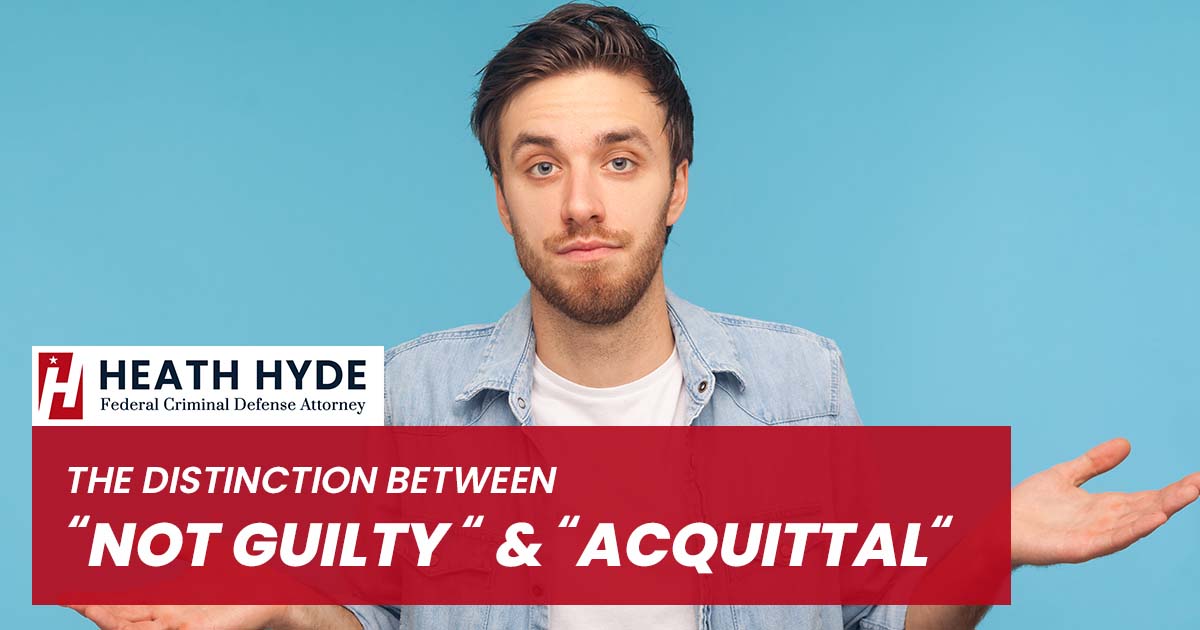While the terms “not guilty” and “acquittal” are frequently used interchangeably, there are times when a person might be declared “not guilty” while also being acquitted of a crime.
Being found not guilty is an acquittal – but an acquittal does not necessarily entail a charge of not guilty, just as a square is always a square but a rectangle isn’t always a rectangle.
Acquittal Is the Result of a Not Guilty Verdict.
To put it another way, finding a defendant not guilty is the same as acquitting him. An acquittal happens when the jury (or the judge in the case of a judge trial) finds that the prosecution has failed to prove the defendant guilty beyond a reasonable doubt.
Some, but not all, charges can be found not guilty by a jury. The acquittal is just partial in that case.
An acquittal isn’t always the result of a not-guilty verdict. For example, trial judges and appeals courts can effectively acquit criminals by finding insufficient proof of guilt. While there is no method for the prosecution to appeal a not guilty finding, there is sometimes a chance to appeal an acquittal judgment.
While acquittal refers to a not guilty result in general, there is a distinction between the two phrases in criminal law. A defendant who is found not guilty is not legally responsible for the criminal charge leveled against him. Acquittal occurs when a judge or jury determines that a defendant is not guilty of the offense charged.
In a criminal case, an acquittal does not imply that the defendant is innocent. Rather, it signifies that the prosecutor did not succeed in proving the defendant’s guilt “beyond a reasonable doubt.”
It’s also worth noting that an acquittal is not the same as charges being dropped. A dismissal occurs before a jury trial and usually occurs for the following reasons:
- If the prosecutor believes there is insufficient evidence to prove the case, or
- The judge determines that a case is not credible.
- The case against the defendant is dismissed, and he or she is not required to stand trial.
- If a defendant is acquitted by a judge or jury, double jeopardy is triggered, and the defendant has a complete defense against a subsequent prosecution for the same offense in the same jurisdiction.
What Is the Process of Acquittal?
For the time being, an acquittal means that the accused person cannot be found guilty of the crime, but it does not always mean that they are not guilty. If there is a paucity of evidence in the case, for example, the jury may believe that the prosecution failed to show the defendant’s guilt beyond a reasonable doubt, as required by law.
However, the evidence presented may not be sufficient to show that the individual is not guilty or totally innocent in the case, and as a result, they may be acquitted.
The fundamental difference between being found not guilty or acquitted is the belief that a person is absolutely not guilty vs not having enough evidence to state that they are beyond a reasonable doubt guilty.
Another significant distinction between a not guilty verdict and an acquittal is the possibility of a partial acquittal. A defendant will be handed a partial acquittal if they are charged with numerous offenses and are found guilty of one but not the other due to a lack of evidence.
This indicates they were found guilty on one charge, but the court did not have enough evidence to convict them on the other.
Even if a person is acquitted, they are still not fully innocent of the crime in the eyes of the law, and they could be held guilty in civil court. This still holds true for not guilty verdicts, which are likewise regarded acquittals. O.J. Simpson is a good example of this.
He was found not guilty and acquitted in criminal court, but later convicted guilty in civil court. Because the concept of double jeopardy only applies to multiple accusations brought against a defendant in the same area of law, and criminal law is distinct from civil law, this can happen.
Is There a Distinction Between “Not Guilty” and “Acquitted”?

There is a significant distinction between the terms “acquitted” and “not guilty” in the criminal court system.
The word “not guilty” refers to a defendant’s legal immunity from prosecution for a specific crime, or even a portion of one. Consider a person who has been charged with both domestic violence and rape. If there is insufficient evidence to substantiate the rape accusation but sufficient evidence to show the domestic violence charge, the accused is not convicted of both charges.
“Acquitted” indicates that the trial judge or jury finds the defendant not guilty after a jury or bench trial. A partial acquittal occurs when a person is found not guilty of one charge but convicted of another after a criminal trial. In the situation above, there would be a partial acquittal.
It’s worth noting that in the United States, an accused person is not considered “innocent” if he or she is acquitted of a crime. It simply implies that the prosecutor failed to show the defendant’s guilt “beyond a reasonable doubt.”
It’s also worth noting that a person:
- may be acquitted of a specific crime (such as DUI or certain marijuana-related charges), but
- found civilly accountable in a civil case for the same offense.
This is due to the fact that the burden of proof in civil trials is lower. This is exactly what transpired in the criminal and civil proceedings against O.J. Simpson.
Is a “Dismissal” the Same as a “Acquittal”?
According to criminal procedure statutes, a “acquittal” is not the same as a “dismissal.”
As previously stated, an acquittal occurs when a judge or jury finds that a defendant is not guilty of a crime after a trial.
A dismissal occurs sooner in the criminal court process when the following conditions are met:
- the prosecutor believes there is insufficient evidence to back up the charge(s), or
- If the judge thinks there aren’t enough resources to try the case or that it’s untrustworthy.
Furthermore, a criminal defense lawyer can petition or approach the court to dismiss the case for the following reasons:
- The defendant was detained by the police without probable cause,
- In the criminal complaint or charge paperwork, the district attorney committed some errors.
- Officials carried out an unauthorized search and seizure, and
- The charges in the case were based on insufficient evidence.
It’s worth noting that dismissal is frequently referred to as “dropping” criminal charges. When a prosecutor decides not to pursue a case due to a lack of evidence, this is known as “dropping” charges. The criminal case is closed in both dismissal and dropping cases, and the defendant is not charged with any crime (s).
It’s also worth noting that the decrease of costs is a separate issue. When a judge or prosecutor agrees to charge a defendant with a lower violation, this is known as a plea bargain.
For example, the District Attorney may choose to prosecute a suspect with a misdemeanor rather than a felony.
If the defendant agrees to a specific plea deal, the charges may be reduced. For example, if the defendant agrees to plead guilty to reckless driving (not including alcohol), a prosecutor may elect to reduce a DUI charge to the lower charge of reckless driving (not involving alcohol). A “dry reckless plea bargain” is what this is called.
Is There Double Jeopardy if the Defendant Is Acquitted?
If a criminal defense lawyer assists in the acquittal of a defendant, there is double jeopardy.
The Fifth Amendment of the United States Constitution contains the Double Jeopardy Clause.
There will be no double jeopardy if you are in double jeopardy.
- prosecution following an acquittal for the same crime
- several convictions for the same crime; and
- numerous penalties for the same crime.
The government loses the ability to re-prosecute a defendant for the same offense after a particular point in the criminal court process. When this happens, the defendant was “once in jeopardy” or “jeopardy attaches,” according to the law.
When a defendant has been acquitted, for example, jeopardy exists.

It’s important to note that once this happens, the prosecutor won’t be able to ask an appeals court to overturn the ruling.
Remember that if a defendant is acquitted in state court, double jeopardy does not prohibit the defendant from being prosecuted for the same crime in federal court — and vice versa. This is because jeopardy only applies to the same sovereign prosecuting the same criminal offenses. In the United States, states are regarded as distinct sovereigns from the central government.
Contact Heath Hyde today for competent and strategic legal representation if you are facing a criminal investigation or criminal charges. We work with our clients to develop a plan that is effective in their situation to avoid charges, gain an acquittal, or rule “Not Guilty”.
To get started, Call 903.439.0000 or submit a free consultation form.
Heath Hyde, a federal criminal defense attorney, brings a team approach to Heath Hyde, P.C., a Texas criminal defense law firm that provides Professional, Personal, and Experienced representation to people accused of Federal criminal offenses in Texas and throughout the United States.
Heath Hyde believes that everyone is entitled to the most powerful and effective defense possible. The firm represents clients charged with crimes ranging from federal white-collar offenses to federal drug charges, federal healthcare charges, and murder in Texas and across the United States.






